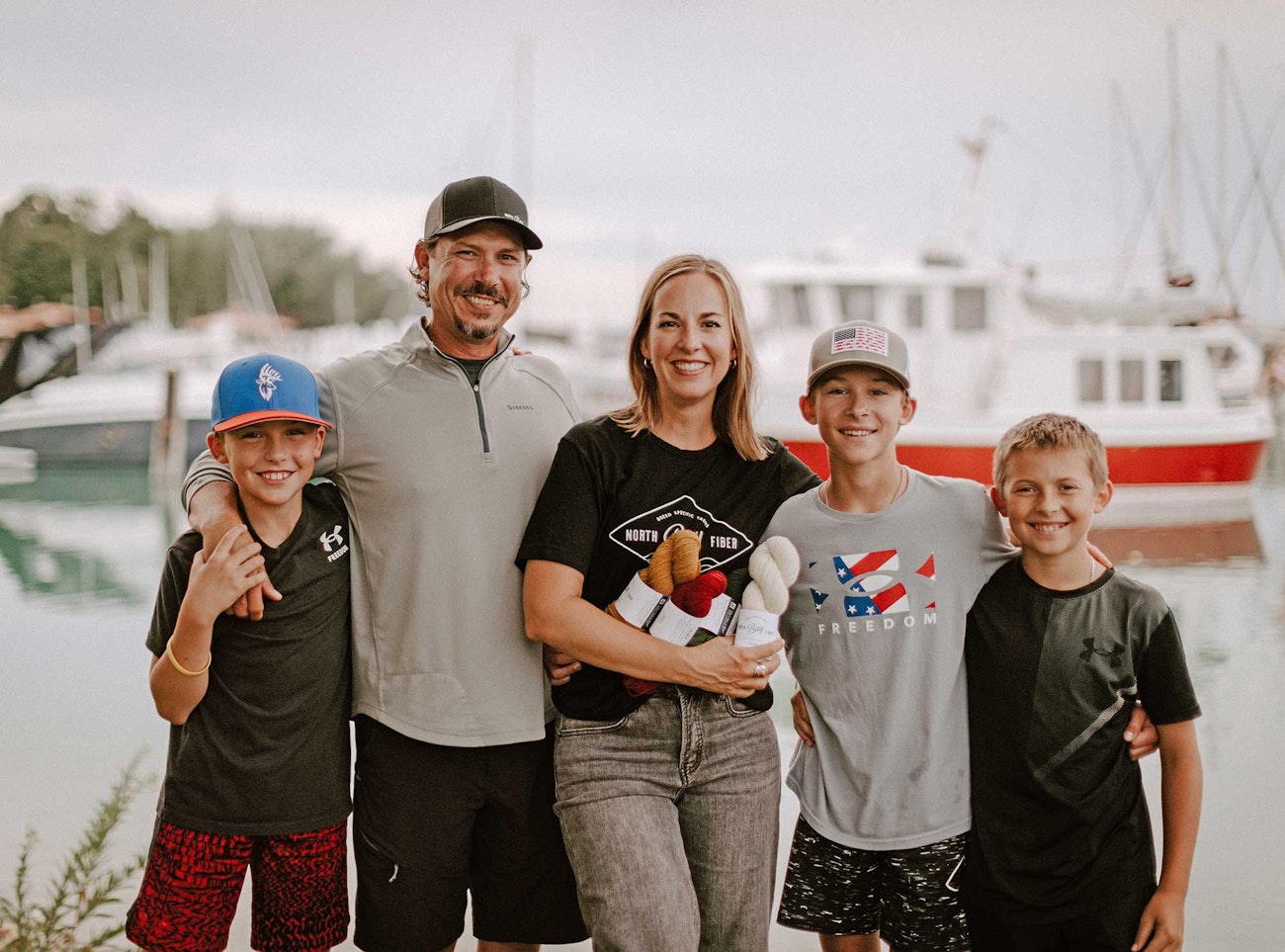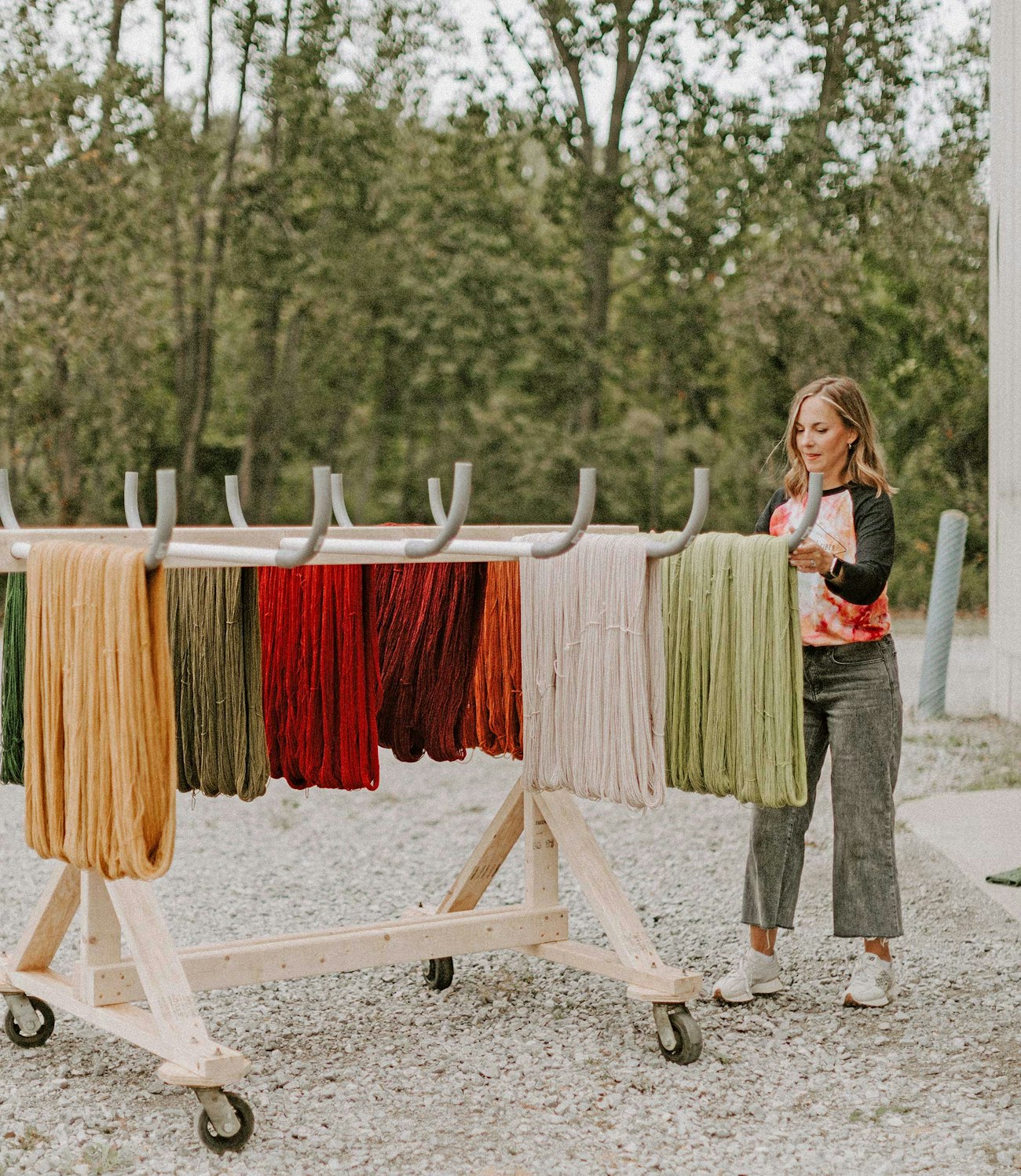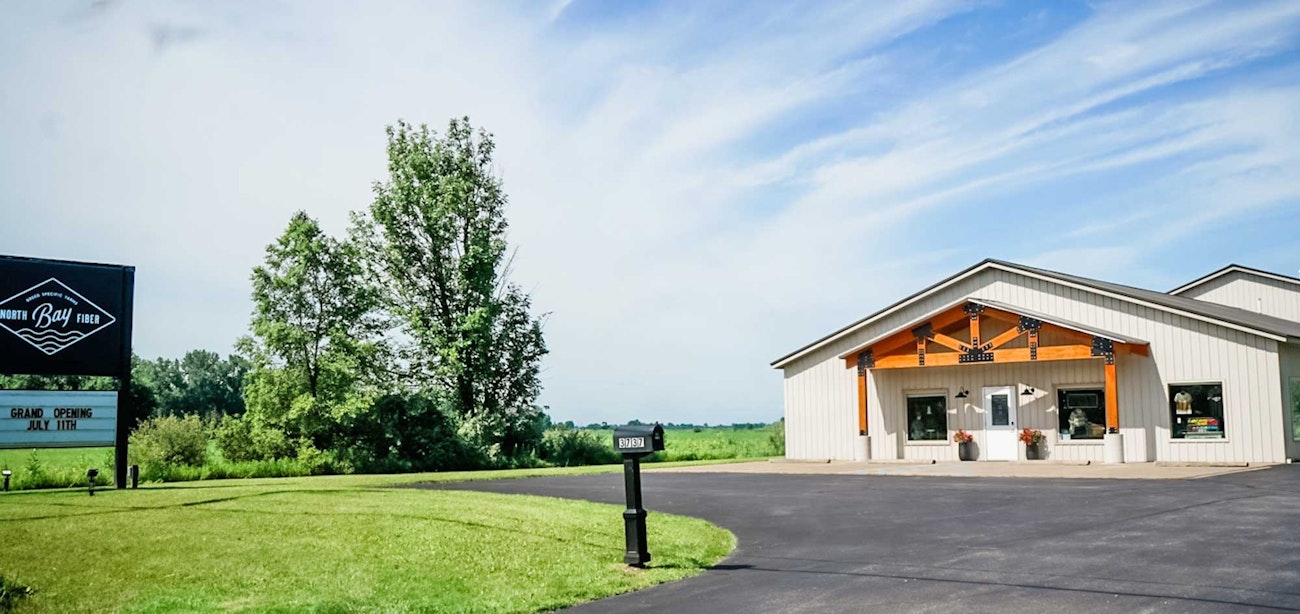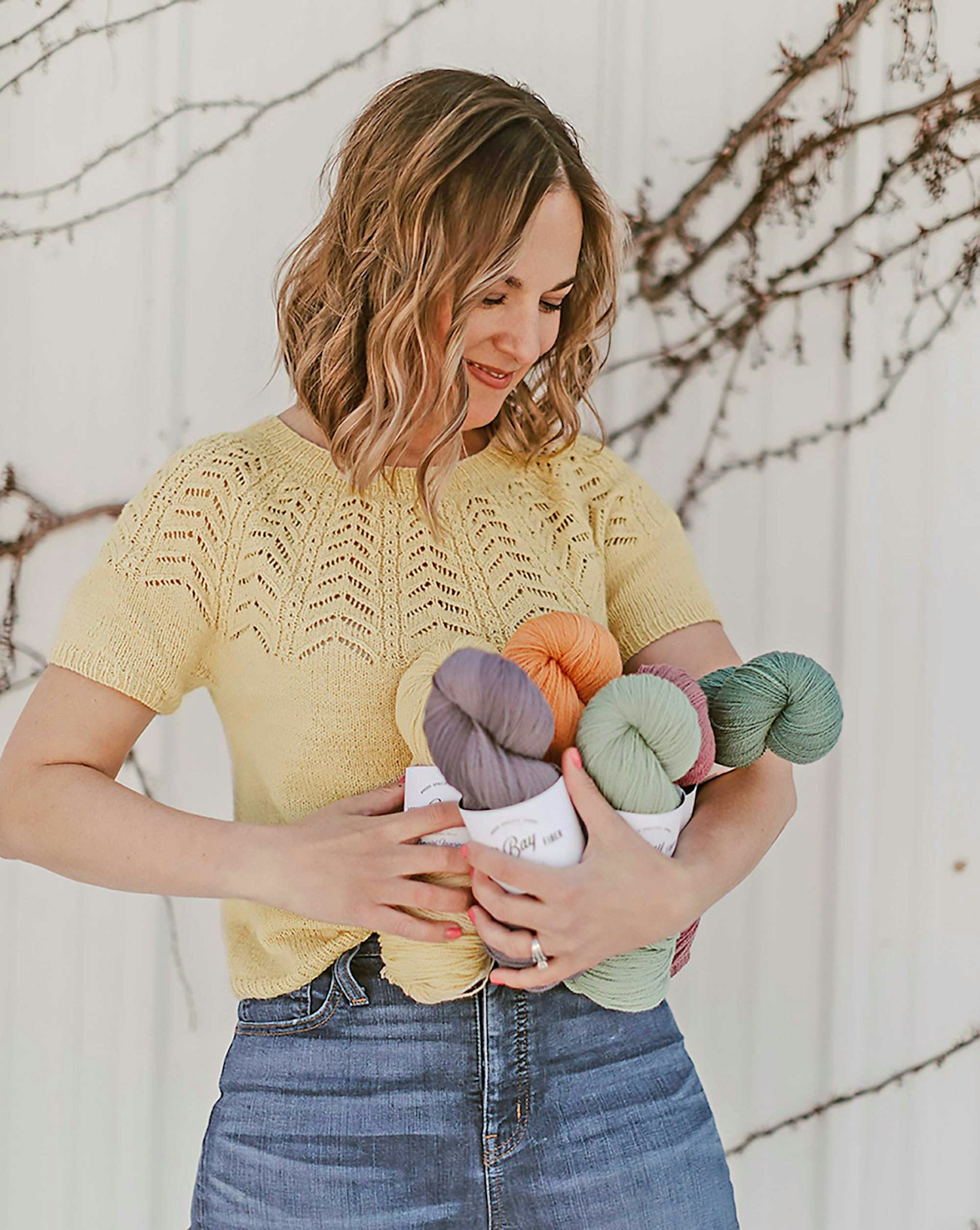Jill Zielinski began working in the yarn industry more than 20 years ago as a freelance graphic designer, working with fiber businesses on branding, packaging, and marketing. She started designing knitting patterns in 2009 under the name Knitterella. In 2021, she founded North Bay Fiber, producing and hand-dying custom-milled breed-specific wool yarns sourced entirely in the USA.
I recently sat down with Jill to find out more about the joys and challenges of making breed-specific yarns.
Farm & Fiber Knits: What drove you to start North Bay Fiber? Was your family immediately on board, or did it take some convincing?
Jill Zielinski: When the COVID-19 pandemic hit in 2020, a lot of my freelance work faded away. I was still designing patterns, and knitting constantly, and I started to feel a pull toward creating something of my own.
At the time, I happened to be redesigning the logo for Zeilinger Wool Mill in Frankenmuth, Michigan. As I got to know April Zeilinger, the owner, I asked her—half serious, half curious—“How hard would it be for me to start my own yarn line?” That moment was the spark.
I wanted to work directly with farmers and mills here in the U.S. to develop yarns that use breed-specific wool and highlight the unique qualities of each fiber. From the beginning, it was important to me to create blends that felt true to North Bay Fiber—yarns that were thoughtfully developed and couldn’t be found anywhere else.
It felt like the right time for a new chapter—and my family was behind me from day one. They’ve been hands-on ever since, helping with the many aspects of yarn production, helping at shows, in the shop, and behind the scenes. It’s truly been a family effort, and sharing this experience with them has been incredibly rewarding.
 Jill and Ed Zielinski with their three sons.
Jill and Ed Zielinski with their three sons.
FFK: What challenges have you faced in starting your company?
JZ: There have been quite a few—some expected, others not so much. One of the biggest challenges has been navigating the supply chain. Sourcing raw wool, working with mills, and timing everything just right is a delicate dance. You only get one opportunity each year to buy fleece, and if something goes wrong—whether it’s weather, processing, or logistics—there’s no easy fix or quick reorder. That’s been a big learning curve.
In the beginning, I was doing it all—sourcing fiber, dyeing yarn, twisting/labeling, marketing, packing orders, managing the website, and running the shop—all while raising three boys. It was (and still is) a lot. When unexpected setbacks pop up—and they always do—it can feel overwhelming. You must be quick to adapt and ready to solve problems on the fly.
 Jill hanging freshly dyed yarn to dry outdoors.
Jill hanging freshly dyed yarn to dry outdoors.
Thankfully, I’m no longer doing it alone. My husband and boys help in so many ways, and my parents have also stepped in to support me. I’ve also built a small but incredible team that now helps with production and keeps the storefront running smoothly. Their support has made such a difference.
But even in the hardest moments, I’ve never doubted the path. Every hurdle has helped me refine the vision for North Bay Fiber and reminded me why I started in the first place.
FFK: Tell me about something that has been a game changer for your business.
JZ: A true game changer for North Bay Fiber happened in the summer of 2024, when we moved into our current brick-and-mortar space. Until then, I was dyeing all the yarn myself in a pole barn on my home property—it wasn’t insulated or heated, and I worked there year-round. Michigan winters can be brutal, with frozen hoses and yarn, and summers were almost unbearable, dyeing yarn in the extreme heat. It was far from ideal.
 The home of North Bay Fibers in Pinconning, Michigan.
The home of North Bay Fibers in Pinconning, Michigan.
Then last July, just four years after starting the business, we purchased a 6,000-square-foot building that had previously been a carpet store. The back of the building is a warehouse-style space that turned out to be perfect for hand-dyeing yarn and storing our wool. The front is a beautifully finished showroom—now home to our retail yarn shop, where we showcase the full North Bay Fiber line.
Since opening the shop, we are slowly adding other yarns and products that pair well with North Bay Fiber and we continue to expand our shop hours and create a welcoming space for the fiber community. We offer classes and knit nights. We also host trunk shows, visiting instructors, and special events. It’s been incredible to see how much interest and excitement there is for knitting and crocheting in our area. Having a real home for North Bay Fiber—one that brings people together—has changed everything.
FFK: What do you wish knitters understood about breed specific yarns and the business of bringing those yarns to market?
JZ: I wish more knitters knew just how much care and thought goes into creating breed-specific yarns. Each breed brings something different—whether it’s softness, strength, drape, or durability—and those qualities can make a big impact on how a finished project looks, feels, and wears over time.
 Jill holds skeins of North Bay Fiber Elemental Fingering while wearing her Bay Breeze Tee.
Jill holds skeins of North Bay Fiber Elemental Fingering while wearing her Bay Breeze Tee.
From a business standpoint, working with breed-specific fiber adds an extra layer of complexity to the process. Sourcing the right fleece, finding a mill that understands how to spin that particular wool, and producing it in relatively small runs takes time, trust, and a lot of planning. There are real limitations—like fleece availability, mill capacity, and seasonality—that make it very different from ordering a standard commercial-base yarn.
All North Bay Fiber’s yarns are non-superwash, which is another part of the story I love to share. I want to help people appreciate just how special wool is in its natural state. It’s breathable, resilient, and holds its shape beautifully. There’s truly nothing like it. When left untreated, it retains so much of its original character—and that’s where the magic really is.
The end result is something truly special: a yarn with texture, history, and a deep connection to the land and animals it came from. Choosing breed-specific, non-superwash yarns supports a slower, more intentional way of making—and helps preserve the fibers, traditions, and stories behind them.
Get a closer look! Click any image in the gallery below to open it in full-screen mode. Shown left to right: North Bay Fiber yarn in Heritage, Elemental, and Journey.
North Bay Fiber currently offers three yarn types:
Heritage is 100% Targhee-Polypal wool from a Michigan flock. This light and lofty woolen-spun yarn is available in Fingering, Sport, and DK weights.
Elemental is 100% Cormo wool from Wyoming sheep. The soft and springy yarn is worsted-spun and comes in Fingering, Sport, Worsted, and Bulky weights.
Journey is 100% Romney wool from flocks in Montague, California, and Indian Valley, Idaho. The strong and lustrous wool is semi-worsted spun into an Aran-weight yarn.
Find North Bay Fiber yarns along with Jill’s beautiful patterns on the website at northbayfiber.com, on Facebook and Instagram @northbayfiber, or at their retail store in Pinconning, Michigan.
Plus! Look for North Bay Fiber's Heritage Sport in the Modern Bohus Hat, by Tanis Gray, and the Durham Chevrons Cowl, by Kate Larson. Subscribers can find both patterns in the Farm & Fiber Knits Library.




